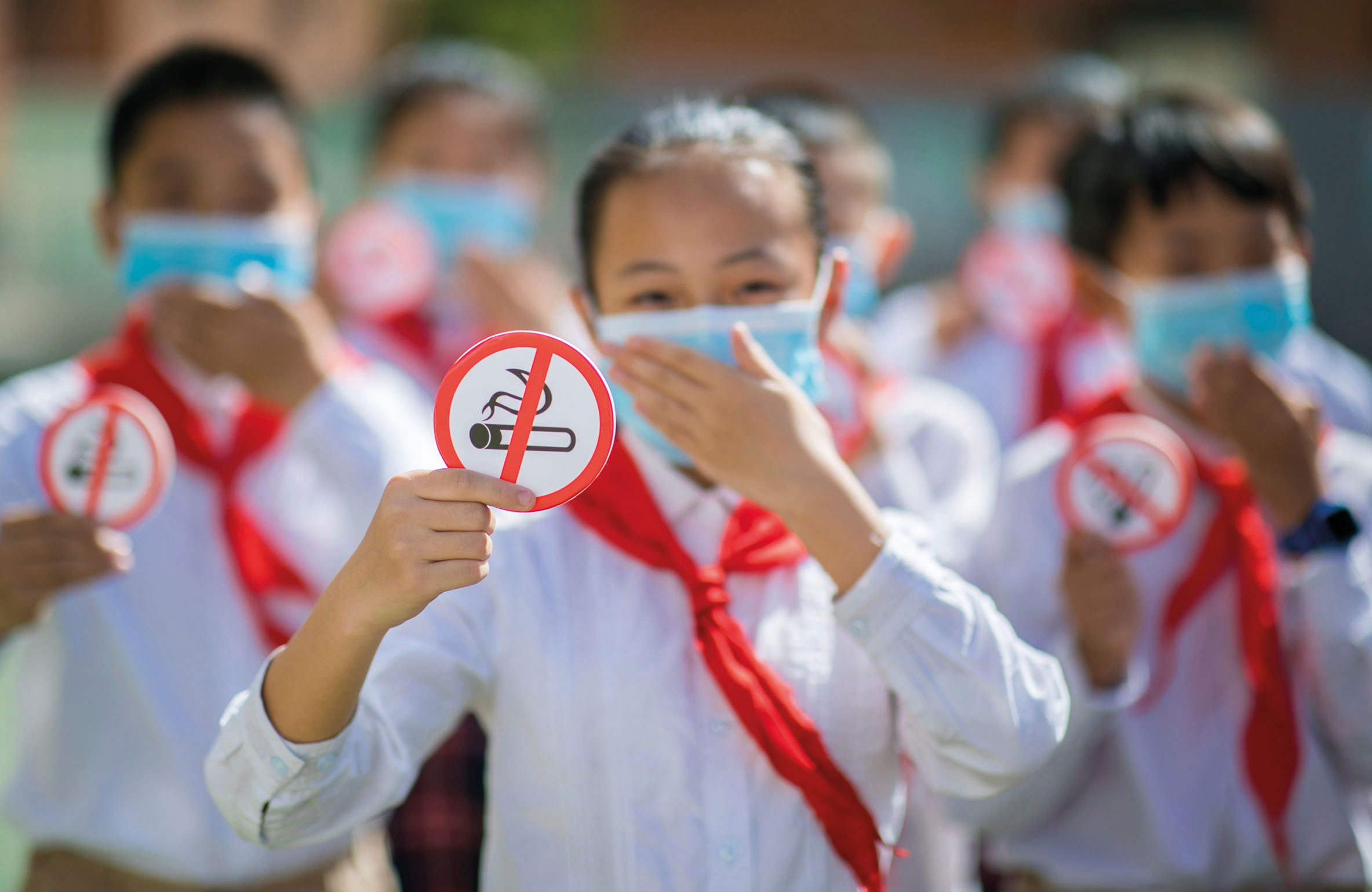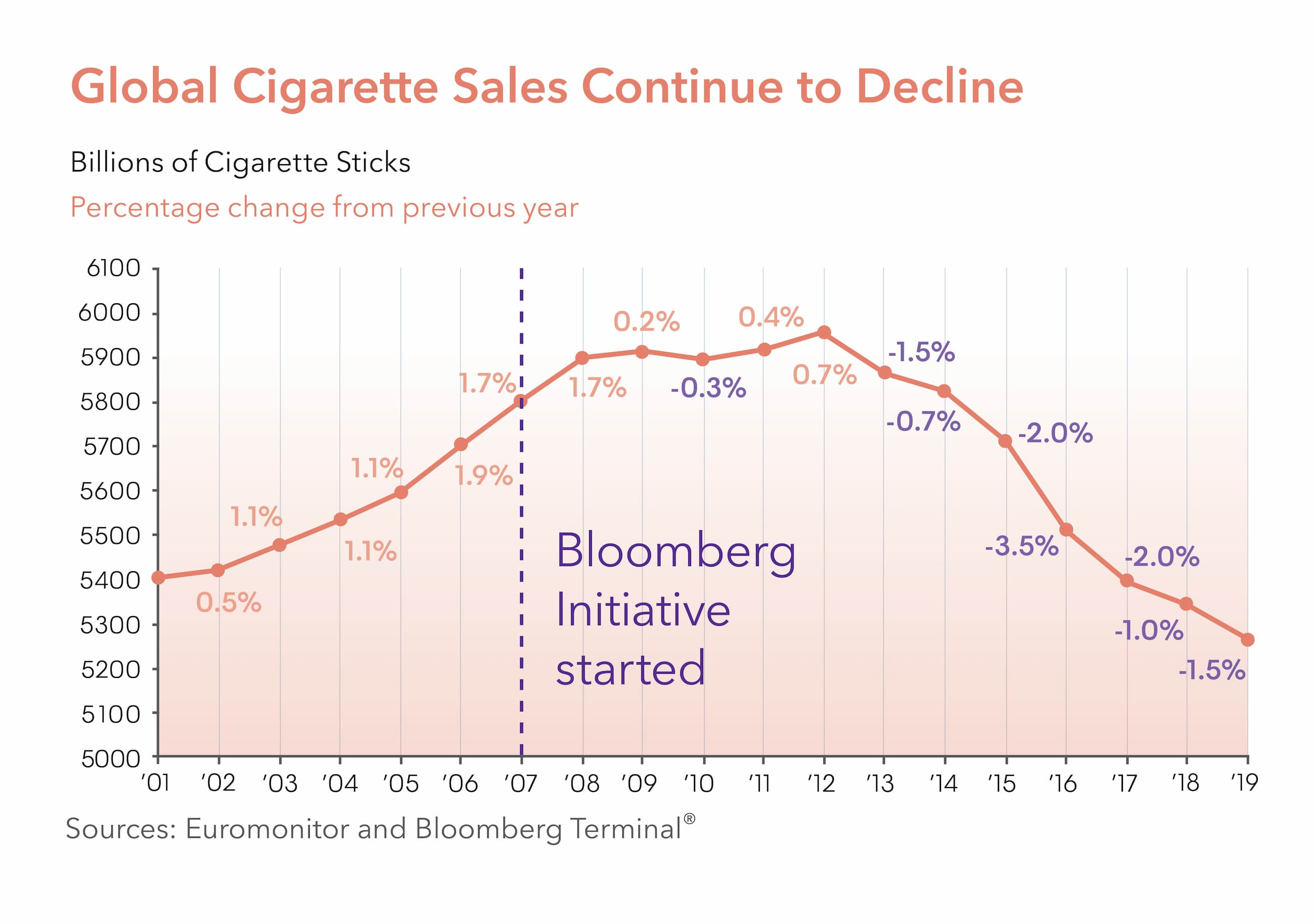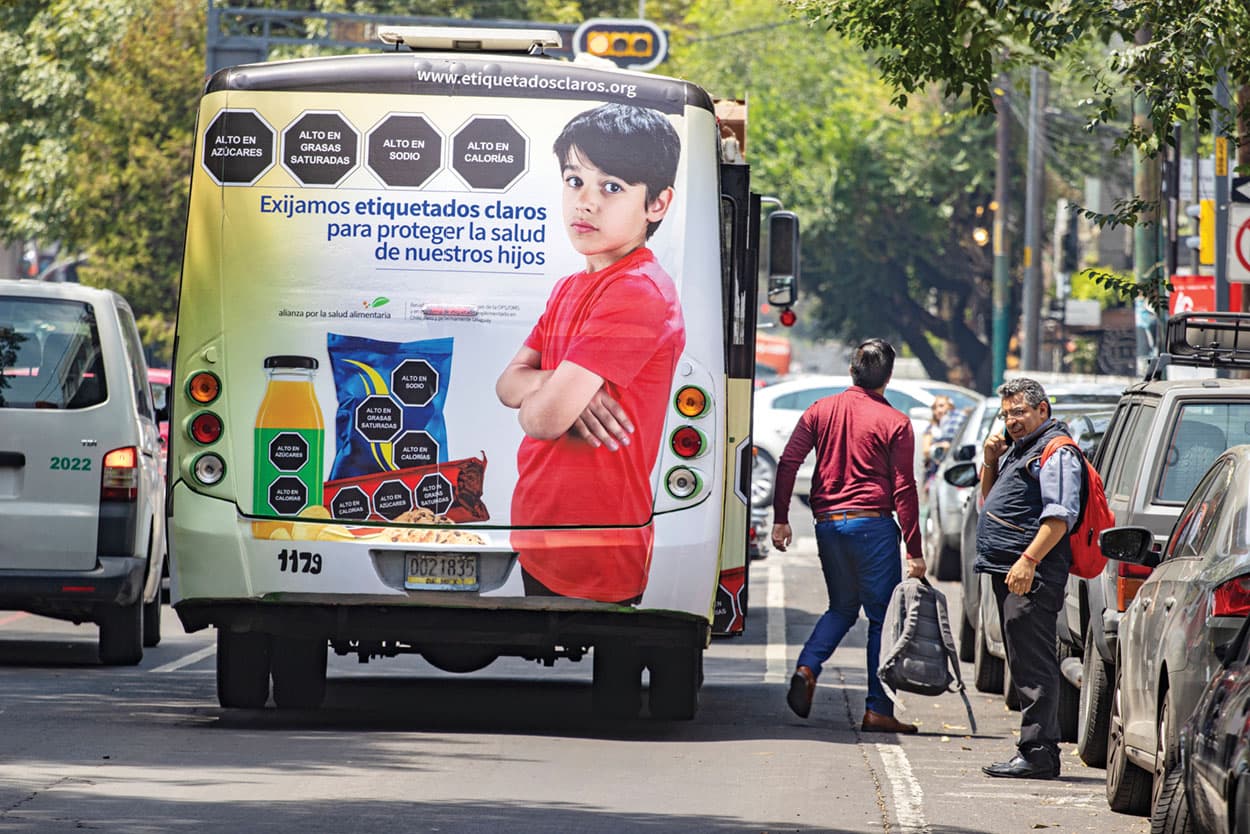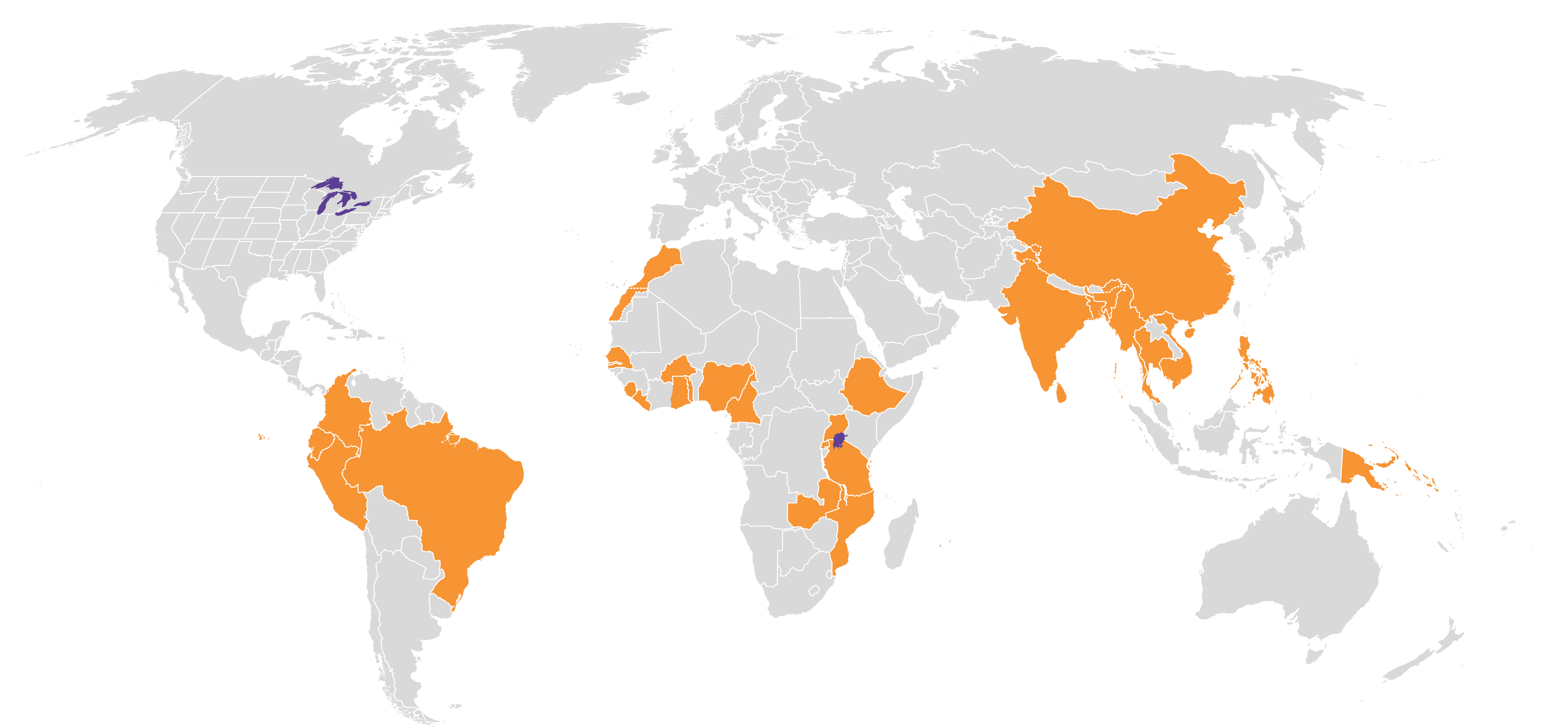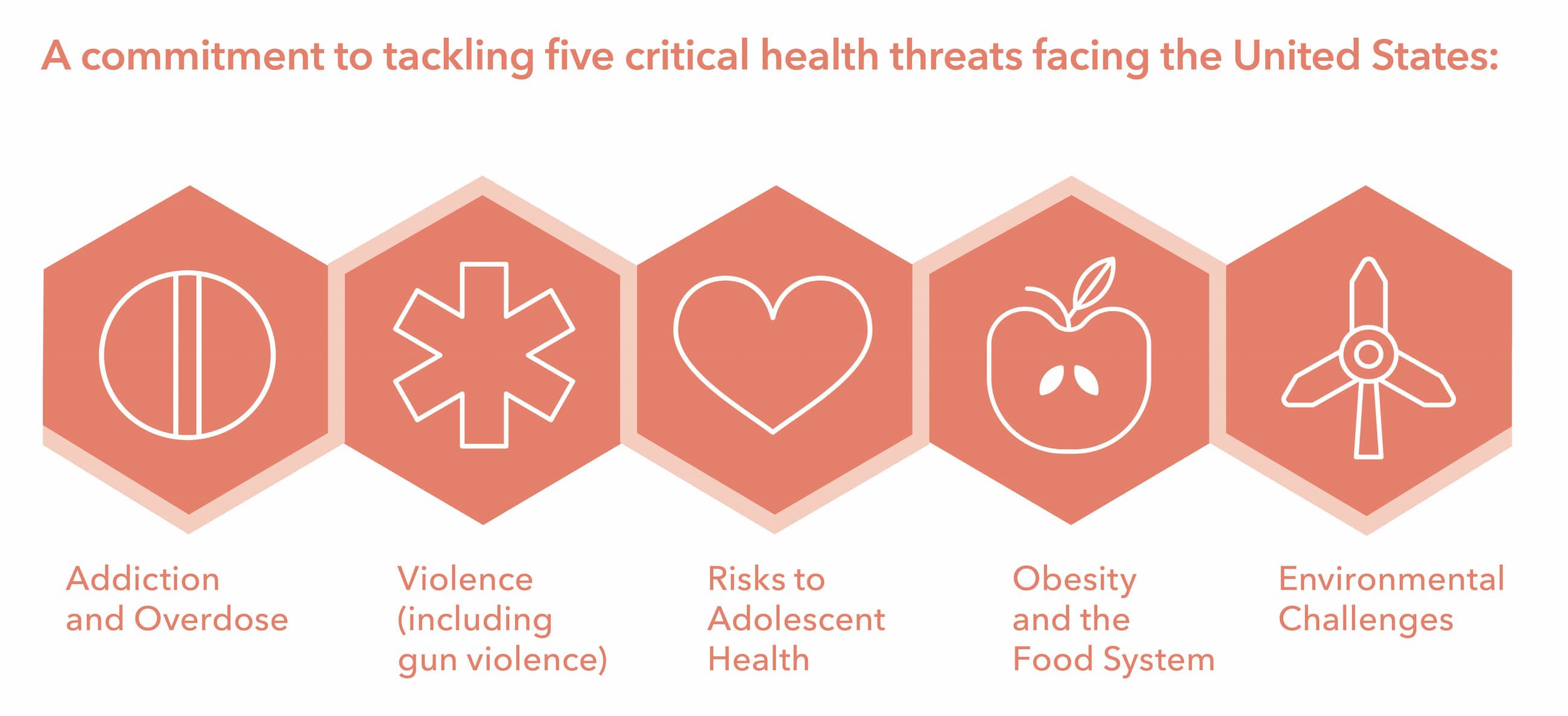Ensuring Safer, Longer, Healthier Lives
Public Health
“An unprecedented global health crisis demands unprecedented global solidarity. I appreciate this support from Bloomberg Philanthropies to WHO and the global response effort, which will help to prevent infections and save lives.”
Dr. Tedros Adhanom Ghebreyesus
Director-General
World Health Organization
Through his role as World Health Organization Global Ambassador for Noncommunicable Diseases and Injuries, Mike Bloomberg launched the Partnership for Healthy Cities in 2017. Membership has since expanded to nearly 70 cities representing more than 300 million people.
Each year, 45 million people die from preventable causes such as injuries, as well as from cardiovascular disease, cancer, diabetes, chronic respiratory diseases, and other noncommunicable diseases (NCDs) that also worsen the outcomes of COVID-19. Each Partnership city has agreed to implement at least one proven policy to fight NCDs and injuries. For example, Accra, Ghana, redesigned one of its most dangerous intersections to improve pedestrian safety, and Quito, Ecuador, implemented a nutrition program to provide healthier meal options to 13,000 schoolchildren. In 2020, the Partnership for Healthy Cities quickly pivoted and expanded its work, responding to member cities’ needs as they mobilized to combat COVID-19.
The Partnership for Healthy Cities moved quickly to expand beyond its original focus and support cities around the world with their COVID-19 responses. The initiative has provided more than $2 million in mini-grants to more than 50 cities, funding communications campaigns on hand washing and social distancing, the development of surveillance systems to track COVID-19 cases and related data, and surveys to understand public perceptions of COVID-19. For example, in São Paulo, Brazil, Bloomberg Philanthropies enabled the city to send three separate text messages to approximately one million residents as part of a campaign encouraging adherence to social distancing and other measures to prevent the spread of the virus. In Yangon, Myanmar, the Partnership for Healthy Cities helped the city launch a social media campaign reaching 3.5 million people. In October 2020, the initiative virtually brought together 1,000 participants from 110 countries to share lessons from cities’ COVID-19 responses.
Leading Through Crisis: Reducing the Impact of COVID-19
in Latin America and Africa
In collaboration with the Partnership for Healthy Cities, the Bloomberg Harvard City Leadership Initiative hosted a six-part virtual learning series featuring Harvard faculty and leading public health experts to provide mayors in Latin America and Africa with sciencebased guidance, crisis leadership tools, and resources to combat the devastating health, social, and economic impacts of the pandemic.
Learn more about the Partnership for Healthy Cities.
Amid a pandemic from a disease that attacks the lungs, people with underlying health issues who smoke tobacco or use e-cigarettes may be at increased risk for serious complications.
One in ten deaths around the world is already caused by tobacco use. If left unchecked, tobacco is expected to claim one billion lives this century. Bloomberg Philanthropies has invested more than $1 billion in tobacco control over the past decade. Efforts have centered on working with national and local governments to enact a package of policies that are proven to reduce tobacco use and save lives, such as package warnings that explain health risks and taxes on tobacco products. This work now spans more than 110 countries and focuses on the world’s largest smoking populations, including in China, India, Indonesia, and Bangladesh.
These efforts are helping make progress around the world. The number of cigarettes sold globally peaked in 2012 and has been declining ever since. The most recent data show a 1.5 percent decline in global sales in 2019 compared with 2018. In 2019 and 2020, 16 Chinese cities and one province enacted 100 percent smoke-free laws, increasing the total to 29 such Chinese cities covering over 170 million people. Today, 65 percent of the world’s population is protected by at least one comprehensive tobacco control measure, up from 15 percent when the Bloomberg Initiative began in 2007.
Taking the fight directly to the tobacco industry, Bloomberg Philanthropies launched a new global watchdog called Stopping Tobacco Organizations and Products (STOP) in 2018. During the pandemic, the industry has ramped up its “social responsibility” efforts and pushed its policy priorities — and STOP continues to expose these attempts to undermine public health.
In the United States, the health of millions of children is at stake. While teen smoking has fallen drastically over the last 20 years, a new generation is at risk of becoming addicted to nicotine. With more than 3.6 million high school youth using e-cigarettes — most of them with kid-friendly flavorings that lure and addict young people — youth vaping has become an epidemic.
To combat this epidemic, Bloomberg Philanthropies teamed up with longtime partner Campaign for Tobacco-Free Kids to launch a new campaign in 2019. The campaign is called Protect Kids: Fight Flavored E-Cigarettes and, based on the latest data, it is making encouraging progress. In the initiative’s first year, eight U.S. cities and states, home to nearly 40 million people, banned flavored e-cigarettes. While youth e-cigarette use is still alarmingly high, it is declining. In fact, the most recent CDC data show that the percentage of high schoolers using e-cigarettes dropped from 27.5 percent in 2019 to 19.6 percent in early 2020. But more needs to be done, and city and state leaders will continue to push for measures that protect children’s health — and Bloomberg Philanthropies will continue to support them.
A poor diet is associated with 11 million deaths annually, making it the leading risk factor for death globally. Obesity rates are rising — and people with diet-related conditions such as obesity and diabetes are more vulnerable to COVID-19. Food insecurity is also on the rise as people cope with job losses and the economic fallout from the pandemic.
Bloomberg Philanthropies supports governments around the world in enacting policies that improve the food system and encourage healthier food choices. An early success story is in Mexico, which passed a landmark tax on sugary beverages in 2014. After studies showed the tax was effective in reducing consumption, governments around the world followed suit. Today, more than two billion people worldwide live in a city or country that has adopted a sugary beverage tax.
2 billion+ people now covered by a sugary beverage tax
The next global food policy movement began in Chile, where the implementation of bold front-of-package labeling and marketing restrictions is making a positive impact. Chile requires warning labels on packaged foods and beverages that exceed certain thresholds for sugar, salt, saturated fat, and 2 billion+ people now covered by a sugary beverage tax calories. The first major evaluation of these labels, published in 2020 with Bloomberg Philanthropies’ support, found a 24 percent drop in sugary drink purchases after the policy was implemented. And, just as Mexico’s success convinced other jurisdictions to pass sugary beverage taxes, Chile’s evaluations are doing the same for front-of-package labeling, including in Mexico and Brazil, both focus countries of Bloomberg Philanthropies’ program. Over the past year, Mexico implemented a warning label regulation and Brazil’s regulatory agency approved front-of-package labeling.
Hear how Mexico is supporting policies to promote healthier diets
To further this movement, Bloomberg Philanthropies has committed an additional $250 million to encourage more governments around the world to enact policies that create healthier food environments. A new partnership with Georgetown University Law Center will train lawyers in global food policy, while a new scholarship fund will support Ph.D. students in relevant disciplines at universities across the globe. In addition, a new legal defense fund will help governments defend strong food policy laws against challenges in court. Bloomberg Philanthropies has also added the United States as a focus geography to address high rates of obesity.
Cardiovascular Health Initiative
Together with the Chan Zuckerberg Initiative and the Bill & Melinda Gates Foundation, Bloomberg Philanthropies supports Vital Strategies’ initiative Resolve to Save Lives’ efforts to prevent millions of deaths from cardiovascular disease and epidemics, with a focus on accelerating action in low- and middle-income countries. In 2020, Bloomberg Philanthropies expanded its support of the organization’s cardiovascular work to also include Resolve to Save Lives’ epidemic experts’ immediate COVID-19 response efforts across Africa.
Over1.3 million people with high blood pressure registered for treatment in Bangladesh, China, Ethiopia, India, and Vietnam
The Data for Health initiative — which helps low- and middle-income countries collect better birth, death, and other data to improve public health outcomes — gained a new urgency during the pandemic. Bloomberg Philanthropies provided technical assistance to 32 national governments, improving their use of data and thus their understanding of COVID-19’s impact. Partner countries also accessed timely webinars on a range of topics related to COVID-19, from the proper ways to complete death certificates and report cause of death to what legal actions are necessary to improve the data collection process.
Nearly 5 million death records newly collected or improved
Every year, half of all deaths in the world — nearly 30 million — go unrecorded, and too many health policy decisions are based on inadequate or incomplete information. Data for Health seeks to close those gaps. Thanks to co-funding from the Australian government as well as support from the Bill & Melinda Gates Foundation, to date, countries representing more than four billion people have worked with Bloomberg Philanthropies to receive technical assistance to improve their public health data — including by collecting data on deaths in rural areas for the first time ever. Governments have successfully implemented improvements to their health data systems, including using national hospital administrators to register births and deaths (Rwanda), establishing new technical units for data analyses (Maharashtra, India), adopting ongoing trainings to use data to inform policy-making (Zambia), and building electronic death registration systems (Peru).
More than 30,000 health professionals have been trained to better collect or analyze data
Amid the pandemic and in numerous existing partner countries, the Data for Health initiative has provided direct data tracking and analysis support and technical assistance to speed up death registration systems. Efforts in Peru have been especially successful after previous work moved the country from a paper-based to an electronic system.
“Thanks to the rapid mortality surveillance tools developed by Bloomberg Philanthropies’ Data for Health initiative and the improved availability of our death registry data, we have new useful information on the pandemic every day. This data allows us to identify the places where excess mortality is occurring and direct resources to prevent the spread of COVID-19.”
Dr. Luis Suárez Ognio
Vice Minister of Public Health
Peru
Reach of the Data for Health Initiative
Each year, road traffic crashes kill approximately 1.35 million people and injure up to 50 million more around the world. To avoid these preventable deaths and injuries, Bloomberg Philanthropies works to improve road safety in low- and middle-income countries across Africa, Asia, Europe, and Latin America. These efforts help to protect everyone on the road, including pedestrians, bicyclists, motorcyclists, and car occupants.
In 2020, the initiative expanded to 30 cities and 15 countries, focusing on five major strategies: changing people’s behavior, including increasing seat belt and helmet use and reducing speeding and drinking and driving; improving road infrastructure to make streets safer; promoting sustainable urban transit options; strengthening road safety policies; and advocating for improved vehicle safety standards. With streets emptying during COVID-19 lockdowns and rates of speeding going up around the world, this work has become more important than ever.
3.5 billion people now covered by life-saving road safety policies since 2007
Since the initiative began in 2007, Bloomberg Philanthropies and its partners have helped save nearly 312,000 lives through strengthened legislation, increased enforcement, and improvements to high-risk roads. In 2019, India passed a law that increased penalties on key risk factors like speeding and drinking and driving. Bloomberg Philanthropies grantees had been advocating for this law since 2013. In addition, partners have reached nearly 100 million people with media campaigns promoting road safety, trained more than 80,000 professionals in road safety strategies, and crash-tested nearly 70 vehicle models across the Americas, Asia, and Africa
When the COVID-19 pandemic reached communities across the United States, it not only contributed to increased stress and isolation, but also disrupted drug treatment programs and harm reduction services. The disturbing result is that U.S. opioid overdose deaths are expected to reach an all-time high in 2020.
More Americans now die from opioid overdoses than from car crashes. Many states, cities, and towns lack the technical expertise and knowledge to implement lifesaving, evidence-based policies and programs to tackle the challenge. That is why in 2018, Bloomberg Philanthropies launched its $50 million initiative to help states craft effective opioid policies and interventions that can be shared across the country, such as increased access to naloxone and ensuring prisons, jails, and emergency departments are implementing medications to treat opioid use disorder.
In both Michigan and Pennsylvania, among the hardest hit by the opioid crisis, the initiative has developed and implemented more than 20 interventions and helped increase access to medication. It has also provided policy guidance and technical support in Maine, New Jersey, New Mexico, Washington, D.C., and West Virginia.
In response to the pandemic’s compounding effects on the opioid crisis, Bloomberg Philanthropies has accelerated its targeted interventions, working closely with its partners at the state and local levels. Some of these interventions have focused on communicating to states about the relaxation of federal regulations to help increase access to medications to treat opioid use disorder and to expand distribution of clean syringes and naloxone through mail order.
Even before the pandemic, the United States recorded an alarming three-year decline in life expectancy — a trend it had not experienced in a century. The United States now ranks 34th in the world in life expectancy, behind most leading industrialized countries.
In response, Bloomberg Philanthropies established the Bloomberg American Health Initiative at Johns Hopkins University in 2016. The initiative supports mid-career fellows in Master of Public Health and Doctor of Public Health programs, endowed faculty positions, public health research, and an annual national summit. It seeks to address five of the biggest public health challenges facing the United States: addiction and overdose; environmental challenges; obesity and the food system; risks to adolescent health; and violence.
Watch highlights from the 2020 Bloomberg American Health Summit
In 2020, the annual Bloomberg American Health Summit went virtual. More than 1,000 people attended the online convening and heard from Mike Bloomberg, prominent public health experts, elected officials, top U.S. journalists, and advocates from across the country. Together, participants examined the impact of COVID-19 on the five health challenges that the initiative was created to tackle — and reimagined a safer, more equitable future for American public health.
Top photo: A health care worker in Ethiopia being trained with personal protective equipment with Bloomberg Philanthropies’ support. Credit: Tewodros Emiru/Resolve to Save Lives

